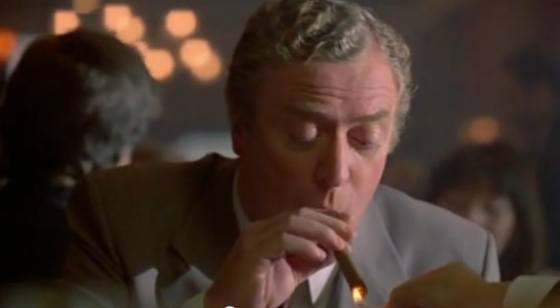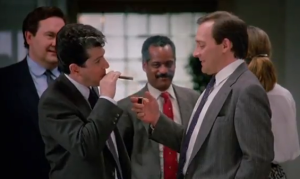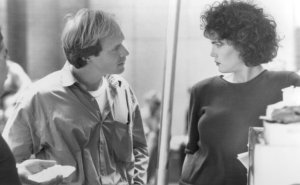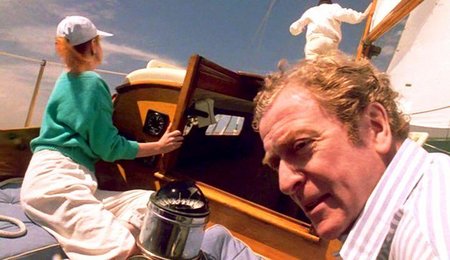Jamie Lee Curtis and I are the same age. I wish I could say that I was in as good shape as she is. I'm also not the badass her character Laurie Strode has become in this update of the "Halloween" film franchise. This movie removes the history of the other nine films, and treats the original as cannon and everything else as a figment of the audiences imagination. I can go with that, but there are a couple of other films that I might want to save before I make this entry the cannon for the future.
So forty years after the original events, Laurie has become a PTSD victim, who has passed on her paranoia to a second generation, or at least she tried to. In a plot lifted from "Terminator 2" , Laurie has been found to be an unfit mother and had her daughter taken from her when the girl was only 12. That daughter grew up to be Judy Greer, a forty something Mom with a daughter of her own in her senior year of high school. There are some pretty obvious beats being set up for the story. The goody goody grand daughter and her friends strolling through the town replicate the early segments of the original "Halloween". Dr. Loomis has been replaced with Dr. Sartain, an apprentice of Loomis. And of course it is Halloween. So expect murders and costumes and people trapped in houses to be filling the screen for most of the time this film is running.
The idea of the traumatic family dynamic is an interesting one but it is under-developed. We don't really know how the relationship between the characters works. Sometimes it seems like the grand daughter and Laurie are strangers to one another and at other times they have a deep bond. Greer's character seems to be indifferent to her Mother's warnings, despite having been raised with the specter of "The Shape" looming over her through her whole childhood. It's not clear if she is a chip off the old badass block or a snowflake who has turned a blind eye to the evil in the world because her Mom is a bit nuts. Jamie Lee is the stoic guardian angel who seems to have been plotting to kill Michael for forty years, but she loses her composure when she most needs it to warn the people she cares so much about. The inconsistencies in the characters undermine the story way more than it can take.
There is a turn about three quarters of the way into the movie that is so out of left field as to be silly. I guess it was supposed to be set up by the opening visit to the mental hospital by two journalists. When the one reporter waves Michael's Captain Kirk mask at him, all the other prisoners react while Micheal remains motionless and as silent as ever. It is as if Michael's evil is contagious, and long term exposure will result in an infection of the same. The only redeeming aspect of this plot thread is that the new villain gets a gruesome comeuppance that looks like it is mostly practical make up effects.
As flawed as the film is, there are several successful aspects to it. I'd say the best sequence is a replay of the scenario in the original film. A babysitter, with a romantic partner while on the job, has to confront the masked killer. There was some nice chemistry between the babysitter, her charge and even the boyfriend. It plays out with the characters fulfilling their destiny but with as much self respect as you could hope for ever one involved. Another very effective sequence involves Phillip Seymour Hoffman's illegitimate son, confronting Michael in the shadow of a light connected to a motion detector. The staging of those moments was pretty tense and there is a solid payoff. I also liked the two cops keeping watch over Laurie Strode's compound. The tone was humorous in a natural way and did not detract from the horror around it.
 Before we get to a couple of comments about the climax, let me rant about a couple of other things that I saw as problems. The whole relationship between the grand daughter and her boy friend is filled with some deep secret that never plays out. He ends up discarded as a character and Laurie's grand daughter Allison, ends up as the new scream queen without much more personal development. The plot thread from the opening with the two journalists does get played out, but in such a contrived situation as to be irritating, in spite of the well put together attack that finishes that part of the story.
Before we get to a couple of comments about the climax, let me rant about a couple of other things that I saw as problems. The whole relationship between the grand daughter and her boy friend is filled with some deep secret that never plays out. He ends up discarded as a character and Laurie's grand daughter Allison, ends up as the new scream queen without much more personal development. The plot thread from the opening with the two journalists does get played out, but in such a contrived situation as to be irritating, in spite of the well put together attack that finishes that part of the story.Two shots in the film will immediately be recognized as reverse call backs to the original film. Allison sees a brief vision out of her classroom window, just as grandma had forty years earlier. That shot also foreshadows a moment in the climax that was the most enjoyable moment in the film. Replicating the double take that Donald Pleasence has at the end of the movie was the fan service moment that most worked for me. I did not see it coming, although I probably should have, but when it arrived, I laughed and smiled.







